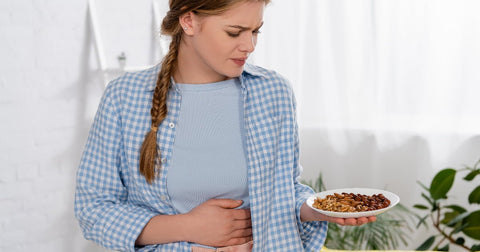Bowel obstructions are not only painful but also potentially dangerous. While certain foods don't directly cause blockages, they can worsen symptoms or increase the risk for those prone to gut issues. Let's examine the culprits and how a food intolerance test kit might help.
Important Note: Bowel obstructions often have several causes, including previous surgeries, medical conditions like Crohn's, and hernias. This article focuses specifically on the dietary side.
Foods That Can Worsen Bowel Obstructions
1. High-Fiber Foods (When Eaten Incorrectly):

- The Benefit: Fiber is crucial for healthy digestion and regular bowel movements. It promotes stool bulk and helps things move along smoothly.
- The Risk: Suddenly increasing fiber intake without enough water can backfire. Fiber absorbs water, so if you're not properly hydrated, it can lead to hard, bulky stools that are difficult to pass, potentially worsening an obstruction.
- Tips: Increase fiber gradually, drink plenty of water throughout the day, and choose soluble fiber sources (oats, beans, citrus fruits) that are gentler on the system.
2. Tough, Stringy Meats:

- The Challenge: Cuts like tough steak or pork can be difficult for your digestive system to fully break down, especially if you already have compromised digestion.
- The Risk: Large, undigested pieces can get stuck, contributing to a blockage. This risk is higher if you have a narrowing in your intestines (from previous surgery, etc.).
- Tips: Choose tender cuts, cook meat thoroughly to soften it, cut into small pieces, and chew extremely well before swallowing.
3. Popcorn & Nuts:

- The Hull Factor: Popcorn kernels and the tough outer shells of nuts are indigestible. While they pass without issue for most people, they can pose a problem if a blockage is already developing.
- The Size Issue: Even if you chew nuts well, small pieces can still get caught in a narrowed area, adding to the obstruction.
- Tips: If you're prone to bowel issues, be mindful of your popcorn and nut intake, especially if experiencing any concerning symptoms.
4. Dried Fruit:

- Double Trouble: Dried fruits are high in fiber, which can be problematic if consumed in excess without proper hydration (see point #1). Additionally, their sticky texture makes them more likely to clump together.
- The Risk: Clumps of dried fruit can get lodged in the intestines, contributing to a blockage. This is especially risky for those with prior gut issues.
- Tips: Enjoy dried fruit in small portions, pair it with plenty of water, and be mindful if you tend to have constipation or are at risk of obstructions.
5. Raw Vegetables (In Excess):
- The Bulk Issue: While incredibly healthy, raw vegetables have a lot of fiber and can be quite bulky. This can be overwhelming for a compromised digestive system.
- The Solution: Cooking vegetables often softens them, making them easier to digest and less likely to aggravate an obstruction risk.
- Tips: Don't eliminate raw veggies entirely but balance them with cooked options, especially if you notice any digestive discomfort.
6. Foods You Don't Chew Well:
- The Size Matters: Insufficient chewing means your stomach and intestines have to work harder to break down large food pieces.
- The Risk: Big chunks of food are more likely to get stuck, especially if you have an underlying issue like a narrowed intestine, slowing transit time, or poor gut motility.
- Tips: Slow down when you eat, take smaller bites, and consciously chew each bite thoroughly before swallowing. If dental issues make chewing difficult, talk to your dentist about solutions.
7. Dehydrating Items:

- The Water Impact: Coffee, alcohol, and overly salty foods have a diuretic effect, meaning they make you lose fluid through urination.
- The Stool Effect: When your body lacks sufficient fluids, it draws water out of your stool, making it dry, hard, and more difficult to pass. This greatly increases the risk of constipation and impaction, which can contribute to an obstruction.
- Tips: Ensure you're drinking plenty of plain water throughout the day. Limit or balance dehydrating beverages with extra water intake.
8. Known Intolerances:
- The Inflammation Factor: When you eat foods your body can't properly tolerate, it triggers inflammation in your gut. This inflammation affects everything from muscle contractions to proper nutrient absorption.
- The Risk: Inflamed intestines have a harder time efficiently moving food along. This slowed transit, combined with potential bloating and gas, increases the likelihood of a blockage forming.
- Tips: A food intolerance test kit is a powerful tool. Knowing your triggers allows you to remove them, reducing inflammation, and improving overall gut function, potentially decreasing your obstruction risk.
Can You Pass Gas If You Have a Bowel Blockage?
It depends. Early in an obstruction, some gas might still pass. Complete blockages usually stop gas and stool passage entirely.
Bowel Obstruction Symptoms: Beyond The Gut

- Severe, cramping abdominal pain
- Bloating & distended abdomen
- Nausea & vomiting
- Constipation or inability to pass anything
- Loss of appetite
Could Food Intolerances Be a Factor?
Absolutely! Here's why:
- Inflammation = Risk: Intolerances cause inflammation, making the gut less efficient overall and increasing risk for blockages.
- Aggravating Existing Issues: Even if not the primary cause, intolerances worsen symptoms once an obstruction begins.
- A Piece of the Puzzle: A food intolerance test kit helps identify triggers, improving overall gut health.
When to See Your Doctor

Don't self-diagnose! See a doctor immediately if you have severe or worsening abdominal pain, persistent vomiting, and inability to pass gas or stool.
If you're prone to bowel obstructions, careful dietary choices can help. Focus on proper hydration, thorough chewing, and identifying any food intolerances. Remember, a blockage is always a medical situation – prompt care is crucial!
Disclaimer: This is for informational purposes and does NOT replace personalized medical advice.
Frequently Asked Questions:
1. I love my high-fiber cereal for breakfast. How can I eat it safely?
Focus on hydration! Drink a large glass of water with your cereal and plenty throughout the day. Also, start with a smaller portion of cereal and gradually increase it as your body adjusts.
2. Does this mean I should always choose cooked veggies over raw?
Not necessarily! If you tolerate raw veggies well, they're very healthy. But, if you're prone to blockages, a mix of cooked and raw is sensible. Notice if certain raw veggies cause issues.
3. I already drink lots of water, so is coffee still a problem?
Unfortunately, even with good hydration, caffeine's diuretic effect can contribute to dehydration. Try balancing each cup of coffee with an extra glass of water.
4. I sometimes rush meals and don't chew well. How big of a deal is this?
It can be a bigger deal than you think, especially if you have underlying gut issues. Try mindful eating techniques – put your fork down between bites, truly focus on the food.
5. Could food intolerances be causing my recurrent constipation and bloating?
Absolutely! Chronic constipation and bloating are often signs of food intolerance. The inflammation they cause disrupts healthy gut function, increasing blockage risk. A test kit brings clarity!


.png?v=1737390083)
.png?v=1737187409)


